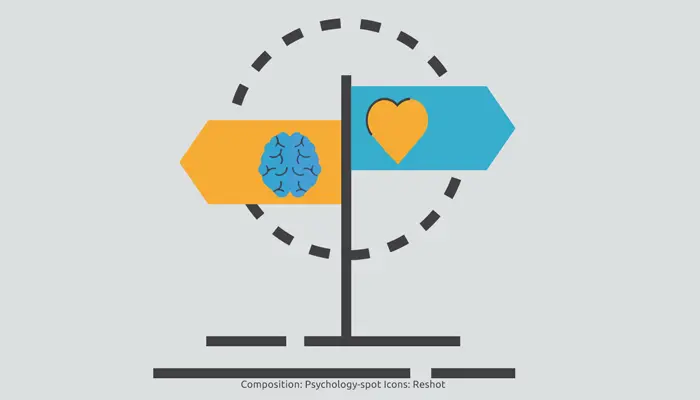
Being indecisive is often experienced as a kind of “curse.” To many people it may seem like an irritating and maladaptive quality. Others may come to detest that peculiarity. Indecisive persons can even seem unreliable because not only are they slow to make decisions, but they also sometimes change their minds.
In fact, our society has always promoted consistency and stability, praising those who remain faithful to its principles, beliefs and decisions. However, the truth is that sometimes that stability in judgments, decisions and behaviors can border on rigidity, moving away from the flexibility essential to adapt to a world in constant change.
The advantage for the indecisive person
Imagine for a second that someone lives in front of you a common situation in old comedies: a person slips on a banana peel. Most people will form a hasty judgment on the victim and assume that he or she is clumsy, which is known as correspondence bias or fundamental attribution bias. In practice, it is the tendency to attribute a behavior to the qualities of a person because we do not take into account the context. We do not think that, in that situation, anyone could slip, including us.
Instead, when we judge our behavior we focus more on the context to justify what has happened to us. It is what is known as “selfish bias” and it helps us to see ourselves in a more favorable light since we look for external reasons that support our behaviors or explain our bad luck. Therefore, if we were the ones who slipped, it is likely that we would not attribute it to our clumsiness, but to the presence of the banana peel on the ground.
Psychologists from the University of Cologne analyzed these attributional biases in undecided and less ambivalent people. They wondered if indecision can provide an advantage in judging the behaviors of others.
Thus they found that the most determined and unambivalent people tend to rush when making extreme attributions when they judge the behaviors of others, so that the forces between internal and external attributions are unbalanced. In contrast, indecisive and more ambivalent people are able to analyze both external and internal factors and make more sensible attributions.
The researchers suggest that the reason indecisive people are less prone to such bias is that “ambivalence leads to broader processing and the incorporation of diverse perspectives.” The most indecisive persons “do not see the world as exclusively good or bad, but more mixed and full of evaluative opposition,” they indicated.
This means that they weigh more carefully all the variables involved in the equation, which allows them to make more balanced judgments than their more determined counterparts. In fact, being indecisive can allow us to evaluate different alternatives to solve problems and make more informed decisions, which could make us regret less when we finally take a path.
The price of indecision
However, such a balanced assessment of the world and the others comes at a cost. A quick decision would be the mental equivalent of removing a band-aid from a wound at once. It can be painful, but it goes away fast. For the chronically undecided, this difficulty in resolving the conflict can lead to tension, worry, and a general negative state of mind that will last until a decision is made.
The solution? Developing an adaptive decision-making process in which we not only take into account the pros and cons of the different options but also let ourselves be carried away by intuition. When it comes to inconsequential or unimportant decisions, it makes no sense to put ourselves under unnecessary heavy cognitive and emotional load. In those cases, intuitive intelligence can take over.
On the other hand, when it comes to important life decisions, taking the time we need to weigh all the alternatives and not rushing into the decision will allow us to choose more wisely.
Source:
Schneider, I. K. et. Al. (2021). Benefits of being ambivalent: The relationship between trait ambivalence and attribution biases. British Journal of Social Psychology; 60 (2): 570–586.



